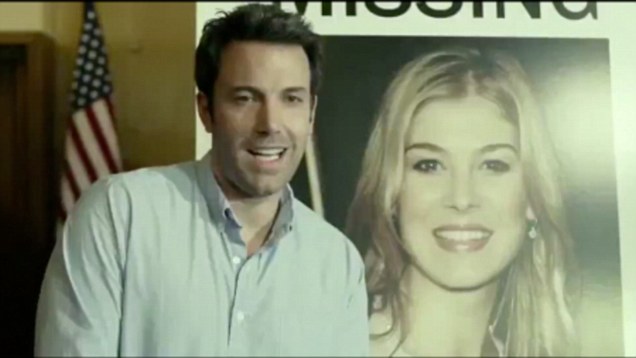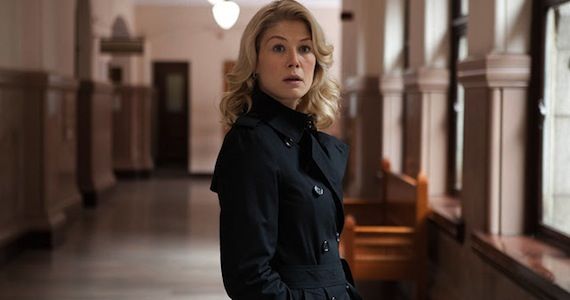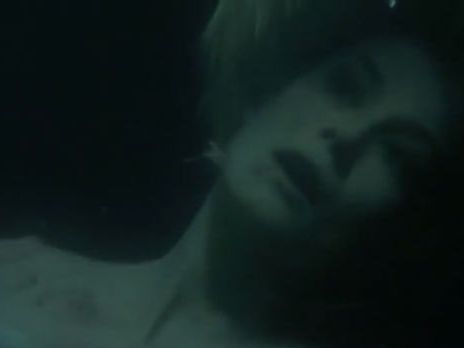
Nick Dunne (Ben Affleck) seems nice enough. He’s certainly good looking, and as a writer for a men’s magazine making a living in Manhattan, even accomplished. In his heart, though, Nick’s a flyover guy who would rather make fun of people who discuss Proust than discuss Proust. Although plenty charming, he’s no intellectual. His idea of escape is to play shoot-em-up video games and drink Regular Guy Beer.
Thanks to her parents, Amy (Rosamund Pike) was born into Manhattan wealth, privilege, and the sense that she will never meet anyone’s’ expectations — even with a Harvard education. Nick fills that void. He loves her and for a while they have it all: a perfect marriage, her million dollar trust fund, and great sex.

The 2008 economic collapse takes her money, and his mother’s breast cancer takes the ongoing drama of their frayed marriage into a rented McMansion in Missouri. Nick makes ends meet teaching and pouring drinks at a bar he and his twin sister Margo (Carrie Coon) co-own. Nick is the kind of guy who names his bar “The Bar.”
On the morning of his 5th wedding anniversary, Nick needs a drink and to commiserate with Margo. It helps a lot that Margo loathes Amy even more than Nick does. Dreading the sight of his wife and the meaning of the day, Nick returns to an empty house where enough is wrong for him to call the police. Before the day is out, Nick is the chief suspect in his wife’s murder and America’s new Ferguson Police Department: a national villain that gives cable news anchors license to puff themselves up with sanctimony before knowing the facts.
As he did with “Se7en,” “The Game,” and “Panic Room,” director David Fincher (working off a screenplay by Gillian Flynn, based on her own best-seller) elevates a pulpy thriller into a mesmerizing and meticulously shot movie-going experience. Fincher also wants to talk about bigger things, most obviously an American news media obsessed with missing blondes and the men who may or may not have murdered them.

Deeper in the subtext Fincher and his screenwriter also want to talk about the state of the modern marriage, or at least how they see it; which is a union under relentless pressure to be perfect and destined to shatter into a million little pieces when it’s not. It’s a good thing this theme is tucked away almost out of sight. This view of matrimony, which only seems to come from our Hollywood and media elite, just isn’t something everyday folks who live in places like Missouri will relate to.
Out here in the real world, tough times not only make a marriage stronger, they sometimes create the most cherished of memories. We’re just too busy paying bills, cutting grass, driving kids to soccer, and thanking God for our countless blessings to waste time striving for someone else’s ideal.
Maybe this is what marriage is like in the elite enclaves on the coasts. Maybe it’s worse — so bad that they feel some sort comfort in seeing others in this way. Either way, you have to pity anyone with such a cynical view of a blessing.
Casting Affleck as the Most Hated Man In America was a genius move on Fincher’s part, and Affleck is more than up to the task. This is a flawless performance; another reminder that the man who seemed destined to go do down as a tabloid joke just keeps surprising with what appears to be a bottomless pool of talent.
As Amy, Rosamund Pike will likely snag an Oscar nomination. There’s no way for me to give proper credit to her performance without spoiling a plot loaded with thrilling detours. You’ll see what I mean.
Rounding out a splendid cast are Neil Patrick Harris as a rich and lonely man from Amy’s past; a truly outstanding Kim Dickens as the detective in charge; Tyler Perry proving he can act as a famous defense attorney and cable news star; Sela Ward as a Diane Sawyer-ish network journalist; and Missi Pyle as a cable TV host who’s obviously based on the execrable Nancy Grace.
Scoot McNairy’s one scene is the film’s best and a true testament to Fincher’s tremendous skills. Directorial magic turns two people sitting across from one another spouting exposition into something as Holy Shit thrilling as an action scene.
Though two-and-a-half hours long, you won’t notice. You get lost in this thing, wondering where it’s going, how it got here, and where in the world it will possibly end. And when it does, you want to turn right around and see it again.
Follow John Nolte on Twitter @NolteNC

COMMENTS
Please let us know if you're having issues with commenting.